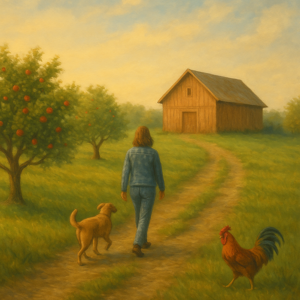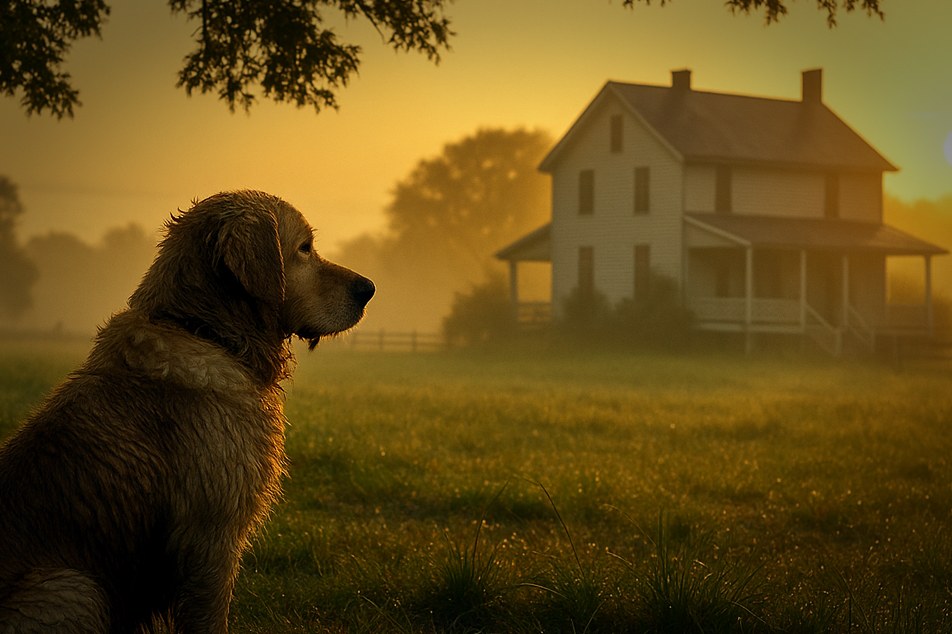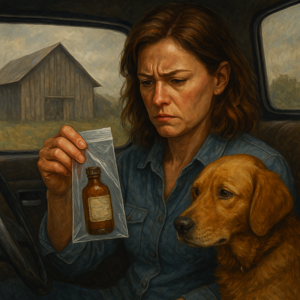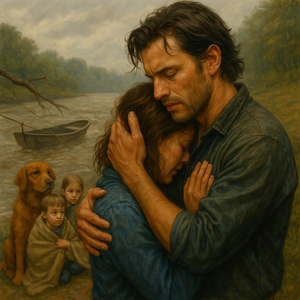Marla woke before dawn again. Restless nights were becoming a habit -- something new for her, especially after years of sleeping late on city weekends.
The house was still and gray in the early light. She poured a mug of coffee while Rudy did his morning business outside, which included a few rowdy barks at the rooster.
She smiled faintly, then sighed. It was too early for anyone with sense to be up, but she hadn't been able to settle since reading the sheriff's report. A trip into town might clear her head. After that, she'd take a better look around the farm — especially the barn.
With Rudy in the passenger seat, her first stop was the drugstore for dish soap, a box of screws, and maybe a little conversation.
Mrs. Cooley had worked the counter for as long as Marla could remember. She still wore bright lipstick and kept a dish of hard candy near the register.
"Good morning," she called as Marla walked in. When recognition hit, her smile widened. "Well, I'll be — Little Marla Bennett! I can't believe my eyes. You're all grown up, and what a sight for these tired eyes. Heard you were back in town. Any chance of staying?"
Marla blushed and accepted the hug. "Your smile could still light up a room, Mrs. Cooley. As for staying — I came to arrange a sale, but I've got a few things to handle first."
Mrs. Cooley returned behind the counter, shuffling receipts. "I heard you had a run-in with Ty Harrigan — and that you stopped by the Sheriff's Office."
"News travels fast," Marla said with a faint smile. "Guess Robert Bennett's daughter coming home stirred the gossip mill."
"Well, you are our local celebrity," Mrs. Cooley said, reaching under the counter and producing a paperback. Secrets. "I'm halfway through it — fine story. I swear I recognize a few characters."
Marla laughed. "Thanks. But it's fiction."
"Ty says he inspired the romance parts."
"Ty can imagine anything he likes," Marla said lightly. "If he shows up in my books, he'll be the villain."
Mrs. Cooley chuckled. "Old wounds still sore?"
"They were healed," Marla said. "Seeing him again just scratched them a bit. Nothing permanent."
She scanned the shelves, choosing dish soap, two scouring pads, and a bottle of water, then set them on the counter.
Mrs. Cooley slid the items into a sack. "Hope I didn't upset you. I do tend to rattle on."
"Not at all." Marla hesitated. "But I do have a question. Did you ever see my dad buy whiskey last spring? Or before that?"
Mrs. Cooley blinked. "Your father? Oh, mercy, no. He gave that up ages ago. Bought coffee, nails, and those cinnamon candies that'll break your teeth — that was it."
A man by the seed rack, Bill Avery, looked up. "Your daddy told me the same. Haven't seen him touch a bottle since before you left for the city."
Marla nodded. "Thanks."
As Mrs. Cooley handed her the change, Marla noticed a curled flyer on the counter: SPRING FLING — Volunteers Needed (Setup 7-9 p.m.)
Halfway down the list of names, Ty Harrigan had a blank box beside him. Someone had penciled in two words: no-show.
Mrs. Cooley followed her gaze. "That was the storm night. Ty was supposed to help with the risers. Jonah and my boy did it alone. Ty never showed."
"Something's never change," Marla murmured. She folded the sack to her chest, thanked her, and stepped outside.
The air had a stillness, a feeling before rain. Rudy stood watching her from the truck. She slid in, set the bag behind the seat, and added Ty — no-show, storm night to the mental file that already held 9:17 p.m.
*****
She turned toward the creek road, planning to check the lower fence before heading home. The sky had gone the color it gets before a storm, even when the forecast swears otherwise.
Rudy sat up, ears sharp. Then he barked — short, hard, urgent. His paw pressed her thigh, eyes fixed ahead.
"What?" she asked, already slowing.
Another bark. Then a whine toward the low bridge.
Around the bend, a jon boat spun in the current — two small bodies inside, one oar missing, the other clattering uselessly.
Marla braked on the gravel and jumped out before the tires stopped crunching. Rudy hit the ground running for the water.
"Stay low!" she shouted. "Hold the middle!"
The girl in the bow screamed as the boat tipped. The boy reached for the drifting oar, missed, and the current turned them broadside toward a downed cottonwood.
"Rope!" a voice called from the fence line.
Jonah was already moving, a coil over his shoulder. He tossed one end toward Marla. "Around that oak — low!" he said, splashing into the shallows. "You stay on shore."
She looped the trunk twice, braced, and hauled the rope across her hip. "Set!"
Rudy swam out, head high. "Bow ring!" Marla yelled over the current. "Tie through and pull tight!"
The girl's hands shook, but she managed the knot. The boat swung and held.
The boy lunged for the oar, slipped, and vanished beneath the water.
"Rope me," Jonah said.
Marla threw the second loop. He clipped it to his belt and dove. Moments later, he surfaced with the boy. "Got him!"
The rope went taut. Marla dropped to a seat and hauled while Rudy angled ahead, line clamped in his jaws.
"Matty!" the girl cried.
"He's got him," Marla said -- whether to the girl or herself, she didn't know.
They reached the shallows. Marla waded in and helped Jonah lift the boy ashore. He coughed once, then sobbed in a rush of air.
"What's your name?" Jonah asked, steady and calm.
"Matty," he rasped.
"You did good, Matty," Jonah said. "Slow breaths."
The girl was still in the boat, frozen.
"I'll get her," Jonah said. He waded back out. "Okay, Ellie — slide to me. Sit, then stand. That's it."
She slipped into his arms. Rudy swam beside them, the rope taut between them.
On shore, Marla ran to her truck and grabbed a blanket — one she'd seen a dozen times but never needed — and wrapped it around both kids. Their teeth chattered. Their eyes were too big.
"You're safe now," Jonah said, kneeling eye level. "You scared yourselves and us too, but you're all right."
Marla exhaled shakily. The adrenaline left her trembling. She crouched beside Jonah and tightened the blanket around Ellie's shoulders. Rudy sat close, head pressed against her knee.
"Thank you," Ellie whispered -- to Rudy more than anyone.
"You're welcome," Marla said softly.
Jonah stood and offered a hand. When she took it, her knees wobbled. Without thinking, he steadied her, one arm firm around her shoulders. For a heartbeat, she let herself lean there — his shirt damp, his breath even — before she stepped back, embarrassed by the warmth in her chest.
"You okay?" he asked quietly.
She nodded. "Almost lost them."
His hand lingered a second longer than it needed to. "You didn't."
Tires crunched on gravel above. A door slammed.
Ty came down the slope, a manila envelope in hand, trying to look concerned.
"Everything all right?" he called. "I was headed out your way -- brought copies of your dad's bills to square the lumber. Heard shouting."
Marla stood. Her jeans clung wet to her legs. Rudy moved to her side, a low growl rumbling.
"You drove out here to deliver bills?" she asked.
"Trying to save you a trip." His smile didn't reach his eyes. "Looks like I picked the right time. Everyone okay?"
"We're fine," she said. "Kids, too."
"Good." He glanced at Jonah, then back. "Whenever you want to —"
"Not now, Ty."
He laughed lightly, pretending this was friendly business. "This place keeps trying to hurt you, Marla. Sell while you can. Let someone who knows what he's doing handle it."
Jonah, crouched by the children, said calmly, "We should get them up to the park office. They can call their folks."
Ty kept talking as if he hadn't heard. "I can close fast. Cash on the table. Clean break —"
"Ty," Marla said. "Enough."
Silence stretched. Only the river and Rudy's breathing filled it. Ty shifted his weight, eyes flicking between her and Jonah as if he were recalculating something. His thumb tapped once against the envelope before he smoothed it flat again.
"Like I said," he murmured, "just trying to help."
"Then help by moving your truck," Jonah said evenly.
Ty studied him a beat, then smiled that small-town smile that never reached his eyes. "I'll get out of your way." He lifted the envelope like a reminder and climbed the slope, his boots leaving shallow prints in the wet earth.
*****
They eased the kids up the path. Rudy trotted close, bumping Ellie's hip like a steady hand. At the road, Jonah called the park office. By the time they reached the ranger station, a white truck arrived with lights flashing softly.
"Let's get you warm," the ranger said, wrapping both kids in blankets. "Your folks are on their way."
Marla crouched beside Ellie. "You're safe now," she said.
Ellie smiled weakly and buried her fingers in Rudy's fur. "Thank you."
When their parents arrived -- shaken but grateful — Marla and Jonah stepped back onto the gravel road. The park quieted around them. Wind brushed through the trees.
Jonah looked at her, his voice low. "You did good back there."
"So did you," she said. Then, after a breath, "Guess we make a decent team."
He smiled faintly. "Looks that way."
Rudy barked once, as if in agreement.
![]()

![]()

![]()

![]()
![]()

![]()

![]()